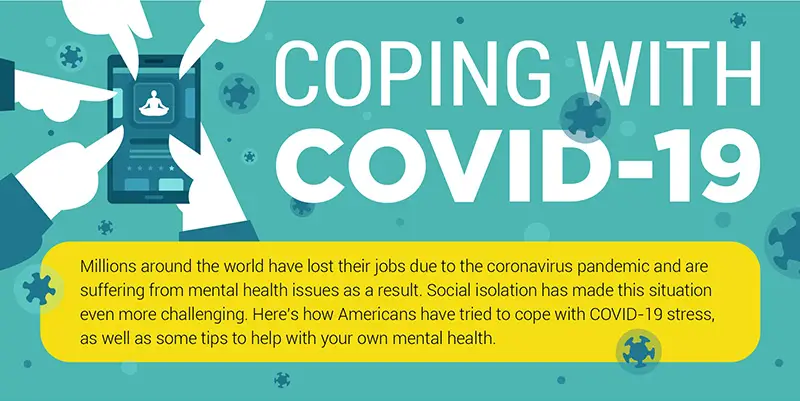Click here to get this post in PDF

With no clear sight to an end, the COVID19 pandemic has been causing a myriad of mental health issues across the country. Currently, traditional face-to-face therapy sessions are on hold until the virus is under control.
However, that doesn’t mean there aren’t ways to find help while struggling with mental health during lockdown. The internet is helping so many during this time who need a hand with their mental health. Anything from finding support groups to making a career change and finding out how to be a therapist, a study by RTT revealed just how our habits are changing when it comes to tackling mental health during 2020, and we discuss below the results of that COVID19 mental health study.

Why Mental Health Issues Are On The Rise
There are many different reasons why the nation is experiencing mental health problems in 2020. The obvious anxiety and stress of keeping loved ones safe and protecting those vulnerable are on many of our minds.
Rising numbers of job losses have caused financial difficulties throughout the world and money trouble will impact the mental health of even the strongest individual.
Loneliness and social isolation are said to be as bad for physical health as smoking 15 cigarettes a day. We are advised to not just avoid seeing friends and family, but even work colleagues, who make up a huge portion of our weekly hours, have now been removed for many.
Alongside the many reasons COVID19 is, directly and indirectly, impacting our mental health, other issues have caused negative emotions within us. The death of George Floyd sparked the mass Black Lives Matter protests, alongside being in the same year as one of the most crucial general elections in our lives.
With all this considered, it’s obvious why 2020 has hit our mental health hugely.
Finding Alternative Help Online
All is not lost for those wanting some help with mental anguish. Search related terms for mental health aid have risen significantly this year.
Some mental health professionals are offering online sessions via video calling applications. Previous to 2020, the peak in those seeking mental health would hit in January, in line with ‘January blues’.
However, this year interest in ‘online therapy’ increased by 96% in March compared to January.
One of the ways people are trying to cope is with mental health apps such as Headspace, Calm and Better Help. Reviews for Headspace along soured a whopping 101 at the peak of the pandemic in July, compared to March.
The Public Are Seeking New Careers
Many members of the public are now trying to find a new career, this could be due to job loss or simply having had time to reflect on their current profession and wishing to do something more fulfilling.
With such a huge focus in the media on looking out for each other and being mindful of others’ mental health, a large number are now seeking to become a therapist themselves, and searching online for the steps to become a therapist has risen x10.
This could also be due to the demand for these professionals, while many industries have witnessed a halt in revenue, therapists are wanted more than ever.
Can Online Alternatives Help?
There is no set ‘cure’ for mental health issues and what works for one person may not work for another.
Online therapy is certainly a great alternative to ordinary sessions, they even provide a great way for patients to access the best professional no matter where they are located.
However, some people may not respond as well, therapy is a very personal thing and by undertaking sessions via a screen, some patients may not get the best results.
Wellbeing apps can provide some great methods to cope with certain issues and many therapists even recommend them, but as a supplement and not a replacement.
Applications cannot be tailored to personal experiences and mental health disorders. Solely relying on them, in the long run, could have drastic implications in the future if a problem isn’t addressed early enough. Therefore, it is important to get a professional Mental Health Diagnosis.
“Our work as psychologists is to help people look at their minds. There are so many mental health apps out there, but they have a short-term effect if people don’t look at their minds and their ingrained beliefs.”- Yasmine Saad, Ph.D. (Psychiatrist).
What Should You Do If You Are Struggling?
There is no shame in admitting that you are struggling, during a pandemic or otherwise.
Seeking therapy, even via online sessions, as soon as possible can help get to the root cause of a problem faster and improve mental health quicker.
If therapy is not available in your area or there are any other factors preventing you from undertaking sessions at this time, these apps can provide some short-term help to aid mindfulness practices; however, they should not be considered a long-term solution.
You may also like: How Managers Can Make Employees’ Mental Health a Priority?
Image source: RTT.com
